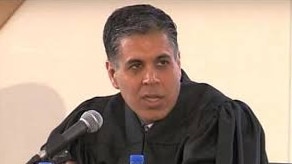
Thapar currently serves as a judge of the US Court of Appeals for the Sixth Circuit which covers a huge slice of the American heartland: Ohio, Kentucky, Michigan and Tennessee.
When Trump was last in the White House, Thapar was twice considered for Supreme Court vacancies. In 2016, when he was first short-listed, he was the only one of the final four candidates who lacked federal appellate court experience.
Trump gave Neil Gorsuch that Supreme Court job. But he appointed Thapar to the Sixth Circuit Court of Appeals, making him the former president’s first appellate court appointment.
Should Trump return to the White House, Thapar now has seven years appellate experience.
He also has something else.
The US journal National Review reported last month that Thapar’s family connections to JD Vance, Trump’s vice-presidential running mate, will set him apart from other potential candidates for the Supreme Court.
Vance’s wife, Usha Chilukuri Vance, is one of Thapar’s former law clerks. Vance lives in Cincinnati, a short drive from the judge’s chambers in Covington, Kentucky. Vance converted to Catholicism – as did Thapar when he married his wife, Kim Schulte Thapar. The families are friends.
The judge is in Australia with Dean Reuter, vice-president and general counsel of the US Federalist Society, for a series of speaking engagements that have been organised by the Australian division of the International Law and Liberty Society and the Samuel Griffith Society.
Thapar is the first US federal judge of South Asian descent and is the author of last year’s remarkable book on Supreme Court Justice Clarence Thomas and his judicial philosophy of originalism. In a discussion with the Rule of Law Institute, Thapar described originalism as a counter-revolutionary approach to judicial method. It relies on the text of the written document and the original intention of the framers.
“In many ways it is counter-revolutionary in that it was the original method by which the founders of the American constitution assumed that the constitution would be interpreted,” he said.
“The court got away from that in the 1950s and ’60s but the original court, like Australia, the original court in America was an originalist court in many ways.”
He argues that the US Supreme Court only began returning to originalism under the influence of the late Justice Antonin Scalia, Justice Thomas and Ed Meese, who was attorney-general during the presidency of Ronald Reagan.
This return to the original judicial method drew criticism because, in Thapar’s assessment, the court’s anti-originalists had “made up rights” instead of applying the written text.
Originalism, by contrast, meant enforcing those rights that were in the constitution while leaving room for the legislative branch to address other issues. It meant pushing decision making down from the judiciary to ordinary people through elected legislatures.
While the judge was at pains to confine his remarks to developments in the US, his analysis provides a framework for assessing similar jurisprudential developments in this country. As long ago as 1997, constitutional lawyer Greg Craven complained about what he considered to be judicial progressivism on the High Court.
Under this approach it is considered legitimate to apply the Constitution in a way that permits judges – not the community – to continually update the nation’s founding document in line with the judges’ perception of social expectations.
To originalists – here and in America – this is anti-democratic heresy that breaches the separation of powers. There is only one legitimate way to change Australia’s founding document: a referendum approved by a majority of the people in a majority of the states.
Thapar’s critique will be deeply unsettling for those who believe judges should go beyond impartial application of the law and give effect to their personal conceptions of a desirable outcome. “The people who don’t like originalism don’t trust living majorities,” he says.
“They often want to say it means letting the dead hand (of the past) rule. No. Originalism involves letting living majorities rule.
“It involves the people in their government and lets them have control of any rights they want to add – whether through laws in their local area or laws nationally.
“It allows judges to be the public servants they were supposed to be, rather than the kings and queens they could be.
“It becomes more of a dictatorship if judges get to make things up and apply that to the American people.
“It’s closer to the ideals that the country was founded on – which is to be a country of laws that is governed by laws, not by men.
“It allows judges to enforce the plain meaning of the law, but nothing more and nothing less.”
Thapar stands on the brink of wielding immense influence over the direction of the US – an achievement built on a commitment to democratic and constitutional principle.
The next step, if it takes place, will be another chapter in the classical story of America.
The judge’s father came to America from an impoverished background in India.
“He was one of five kids and he was the one who graduated so his mother gave him five dollars and a one-way ticket and told him to go make something good of yourself,” Thapar says.
Chris Merritt is vice-president of the Rule of Law Institute of Australia. A video of the discussion with Judge Amul Thapar will be posted next week on the institute’s website.




Amul Thapar, who is on a speaking tour of Australia, is already one of America’s most senior judges. But if Donald Trump wins November’s presidential election, this son of Indian immigrants might be heading for the US Supreme Court.